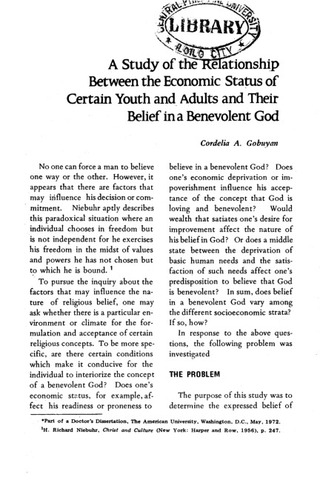A study of the relationship between the economic status of certain youth and adults and their belief in a benevolent God
요약
No one can force a man to believe one way or the other. However, it appears that there are factors that may influence his decision or commitment. Niebuhr aptly describes this paradoxical situation where an individual chooses in freedom but is not independent for he exercises his freedom in the midst of values and powers he has not chosen but to which he is bound.
To pursue the inquiry about the factors that may influence the nature of religious belief, one may ask whether there is a particular environment or climate for the formulation and acceptance of certain religious concepts. To be more specific, are there certain conditions which make it conducive for the individual to interiorize the concept of a benevolent God? Does one’s economic status, for example, affect his readiness or proneness to believe in a benevolent God? Does one’s economic deprivation or impoverishment influence his acceptance of the concept that God is loving and benevolent? Would wealth that satiates one’s desire for improvement affect the nature of his belief in God? Or does a middle state between the deprivation of basic human needs and the satisfaction of such needs affect one’s predisposition to believe that God is benevolent? In sum, does belief in a benevolent God vary among the different socioeconomic strata? If so, how?
기술
Journal article
추천 인용
Gobuyan, C. A. (1973). A study of the relationship between the economic status of certain youth and adults and their belief in a benevolent God.유형
Article주제
Collections
- Southeast Asia Journal [188]


